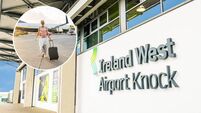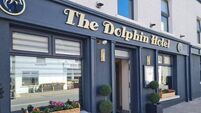‘Tax might get them here, but it won’t keep them here’
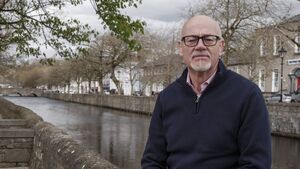
Pat O'Donnell, former managing director of Allergan Pharmaceuticals, pictured along the Mall River in Westport. Picture: Michael Mc Laughlin
How does the West sustain the businesses that have brought so much good, and how do we attract more of them in the future?
As part of a series of articles where I will interview leaders about how we build a better West, this week’s piece explores the importance of the multi-national and international trading business sector to our region.
Kilmeena native Pat O’Donnell rose through the ranks at Allergan (now AbbVie) in Westport, in a career that spanned 37 years. He is ideally placed to reflect on how the West can develop and sustain great multinational businesses and thus provide opportunities for people here – and that’s not just because of his working life in Allergan, but because of his deep commitment to the region, evident in his involvement in community organisations of which Croí and the GAA are only two.
What do international companies mean to Ireland?
We are home to over 1,600 of them, in ICT, life sciences, financial services, medical technology, pharmaceuticals, technology, and engineering, and they directly employ over 250,000 people. There are 120 IDA client companies in Galway, Mayo and Roscommon, employing 27,695.
The story of their presence here begins in the late 1950s when economic failure led to an ever-declining population. Encouraging Foreign Direct Investment (FDI) and opening ourselves to markets through EU membership were keys to changing that.
You can measure the success in statistics, in number of jobs or the percentage growth of the economy or of tax revenues, but to me – with a family defined by emigration – the arrival of these companies meant that we no longer had to go abroad in such numbers to sustain a decent standard of living.
Good and all as they have been, what can be done to attract more of them, how can we best maintain the presence of the excellent firms we have, and what can people in our region who want to work in and indeed lead such companies do to further that ambition?
Pat O’Donnell understands all these questions intimately. Born on a small farm in Kilmeena, the third eldest of a large family, he wanted to head off as soon as he could and join the Guards.
His mother – who sadly died early in Pat’s life – advised him to take a different path. Allergan had arrived in Westport in 1977, and after college in Galway, he joined the company in 1980 as a lab technician.
Standards and quality were his area of expertise, but he obviously had additional qualities that his bosses were quick to see, and they suggested a move to Allergan HQ in Irvine, California. His two years there were great career-wise but with a young family he was keen to come home to Westport. He took the chance to do so, and further promotions followed all the way to managing director in 2005. On retirement in 2018, he was Head of Global Operations, managing 12 sites across the world including Westport.
His mother had told him that one day he would have ‘a big job with a big car’ and when that came to pass, he shared the moment with her at her graveside. Many is the person from Mayo who will relate to that moment.
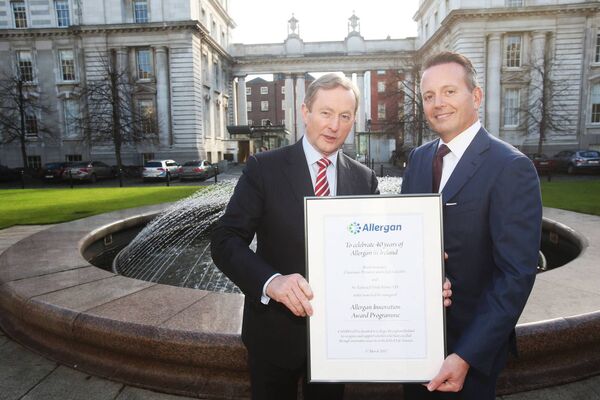
What brings these companies to the west of Ireland, and keeps them here?
When I asked Pat about what attracts these firms, he explained it this way: “The tax might get them here, but it won’t keep them here.”
The tax rate is the hook, but that on its own won’t keep firms in the West of Ireland long term. Companies have options, both in where they invest and how much of their activity they commit to your location, and in making those decisions a track record of success is a big factor.
Throughout our discussions, Pat emphasises that these successes are built on the calibre and attitude of people, and is dismissive of anyone skeptically thinking that ‘the quality of people’ is just a thing executives say.
“If you have the right people it’s easy,” he says, “and if you have the wrong people it’s near impossible.”
He feels that our can-do spirit is why we have had so many successful companies for so long in our region.
He also feels that the quality of life here is a big and growing plus in attracting those people and keeping them working in these companies. An easy commute and an attractive standard of living are central to that.
For that reason, social facilities in our community are key. Pat O’Donnell peppered our talk with examples of this process and how important it is in keeping good people in the region and attracting good people from outside it. This is a vital part of the bargain with the company owners investing here. So, for all those working on developing community, artistic and sporting facilities, the lesson is clear: as well as all the other benefits, the economic case for these is clear, tangible and growing.
What do international firms bring to the region?
We all know that the salaries from these firms matter, as does indirect employment, but in what wider way do they bring benefits? This produces another clear answer from Pat: they bring high business standards that have knock-on value.
Internationally trading firms such as this do not so much demand as exist on high standards: their insistence on them has positive spillover effects in our wider economy. Those standards, whether that be in health and safety or on production or technical values on the shop floor, or in employees’ upskilling, are crucial.
No company like this will purchase goods or services from a supplier that can’t ensure high standards, and meeting those high standards again and again then benefits that supplier in the wider marketplace. As one example, Pat picked out – and praised highly – Duffy Stainless Steel in Castlebar, which specialises in stainless steel products for the pharmaceutical, medical and food industries.
What are the challenges in maintaining the firms we have?
Apart from restructurings – where the ability to influence locally may be more limited – and the ups and downs of the business climate, Pat O’Donnell emphasises that when people are key, any hint of complacency in any company would be a problem.
The absence of significant industrial relations issues in these companies locally has certainly been a benefit, but it goes much wider than that.
“You have to keep meeting the standards and achieving compliance,” he says, because in the internationally traded export environment, “quality trumps everything”.
The local management of these firms are constantly pitching internally within their wider company to gain new business operations at their site. To win those internal allocations of work, or indeed to defensively try and maintain as much capacity as possible locally when wider restructuring is planned, you need to be able to point to a strong track record of compliance, high standards, and constant performance improvement.
Demonstrating that is vital to your success in running any such business in the West of Ireland. On good days, this is what the IDA call ‘expanding the mandate’, where you add value to the existing operation.
Why we are good at that?
“It’s a sense of pride in what we do,” according to Pat O’Donnell. “It’s a sense of work ethic and creating a culture where we are in this together.”
It’s also the case that potential corporate investors consult with their peers. What the corporate leaders of our existing companies say about their own operations today matters a lot for the companies we might welcome tomorrow.
What kind of skills do you need to run a business like that in the West?
“First and foremost, you have to know the business,” says Pat.
The technical skills are important, he adds. This gives those trained as scientists and engineers – and we produce a lot of those – a real advantage.
Once you have that, it becomes easier to hire and then let good people get on with doing their job – and Pat has a shrewd insight for those who aspire to promotion into senior roles: if you are great at what you do currently, be sure you identify someone who can succeed you.
“You also need to enjoy coming to work and have a good work-life balance,” something which, Pat states, is vital to taking on a senior role.
He emphasises the value of mindfulness, something he introduced way back in 2005 when he called it ‘mental exercises’.
You also need to be a good ambassador for your company, someone who can engage both with the senior leadership of the company – often US-based – and with state agencies about what you are trying to do. Employees very much want you to do this well: your leadership matters when the company’s fortunes have so much impact on people’s lives.
As a former president of IBEC West, Pat is a believer in business networks – an important way for businesses in the West to avoid becoming insular, and ensure they are connected to what is happening. Being willing to be mobile, in particular at a developing stage of your career, is another way to avoid that insularity and build networks.
But while it was noteworthy that – as he puts it – a guy from a small farm in Kilmeena who started as a lab technician should be appointed head of the business in 2005, he ultimately doesn’t think that where you are from is a plus or a minus.
What is the role of state agencies?
Pat praised the Castlebar campus of Atlantic Technological University, whose role in upskilling workers is a vital one.
State agencies and IDA in particular help in making connections and getting you time with the people you need. In return, “it is people like Allergan in Westport and Boston Scientific in Galway who provide the examples for them” to help promote the region to other potential investors.
The IDA strategy document, Driving Recovery and Sustainable Growth, 2021-24 is essential for anyone interested in these issues. It addresses the challenges of attracting these companies to areas other than cities. It is a difficult balancing act – and often subject to criticism – but Pat O’Donnell feels “the IDA do a super job for Ireland, super”.
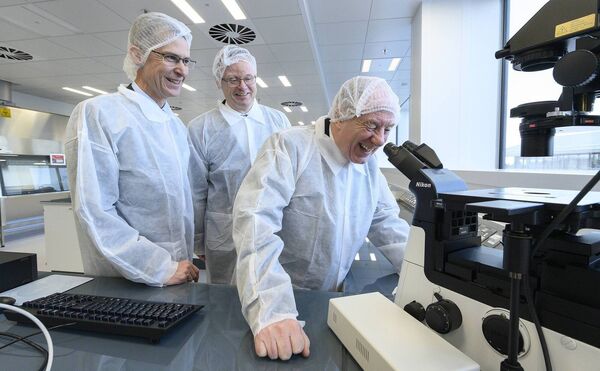
Does Mayo have a cluster?
A ‘cluster’ is a term used to describe a geographically concentrated set of these businesses. Cork’s cluster is pharmaceuticals. For Kilkenny, it is financial services. Dublin has a cluster of, well, everything.
The idea behind a cluster is that establishing a successful business of a particular type once in a location makes it easier to do it again and again. Galway’s cluster is medical technology and Pat O’Donnell feels it grew out of Boston Scientific.
“Why did all the medical device companies end up in Galway? It (Boston Scientific) is a magnet for others to come in.”
By contrast, he feels “Mayo does not have a cluster – what we have is more an accident, really.”
Hollister, Baxter, Allergan (AbbVie) and Coca-Cola Ballina make up the core of that.
A question for us is how we can attract more of these businesses to our region.
Is it to engage within Galway’s MedTech cluster, or by arguing for more infrastructure in our region which would sustain and attract more stand-alone success stories?
Galway certainly offers opportunities, not least because of their own infrastructural capacity issues, but the focus of Pat O’Donnell’s own advocacy has been on developing infrastructure to support the needs of businesses broadly like the one he ran, whichever particular sector that business is in.
What kind of infrastructure do we need to attract more of these companies?
Roads, roads and roads – and one in particular. “We spent a long time campaigning about getting the N5 upgraded,” he tells me.
To get to the county, the N5 is strategically vital for Mayo, and a strategic focus is what we need.
“For an American investor, 135 miles from the major airport is nothing, but when you are told it takes over three hours to do it,” that creates a problem – it makes you seem remote.
So, while of course, the Turlough to Westport road is really welcome, it’s the poorest sections of the whole road that lead to Dublin Port that are key, and therefore completing the stretch from Scramoge to Frenchpark is vital.
“The difficulty is trying to get the road upgraded outside the county boundaries,” he says, clearly a little skeptical of our capacity to focus our public debates on these issues in a strategic way – and to understand that the road that matters most to Mayo is in Roscommon. To him “strategic means long-term view” and our political system does not reward long-term thinking.
On the other hand, he warmly welcomed the new flight to Heathrow.
“If you are able to come from New York through Heathrow to Knock, that is huge” because it increases connectivity for these vitally important firms.
Reliable water, energy and broadband matter too, as do sites to build good plants without major planning issues. Housing supply matters because of those quality of life metrics that make a region attractive.
How do we make the case for needed investment in infrastructure?
The danger is that you talk the place down in order to build it up. How does that fit with how these companies feel about the world?
Pat says his approach is to frame it positively.
“Look at all we are managing to do despite the lack of resources. If we had the infrastructure we could move up the value chain even further. We have tremendous pride in what we are doing and what we were achieving: we can do more.”
It is in this language – not of the poor mouth or grievance but of potential based on track record – that we should root our advocacy for greater investment in our region. That is the challenge for all of us who, like Pat O’Donnell, care about our future, and have thoughts about how we can all play a major part in developing it.
